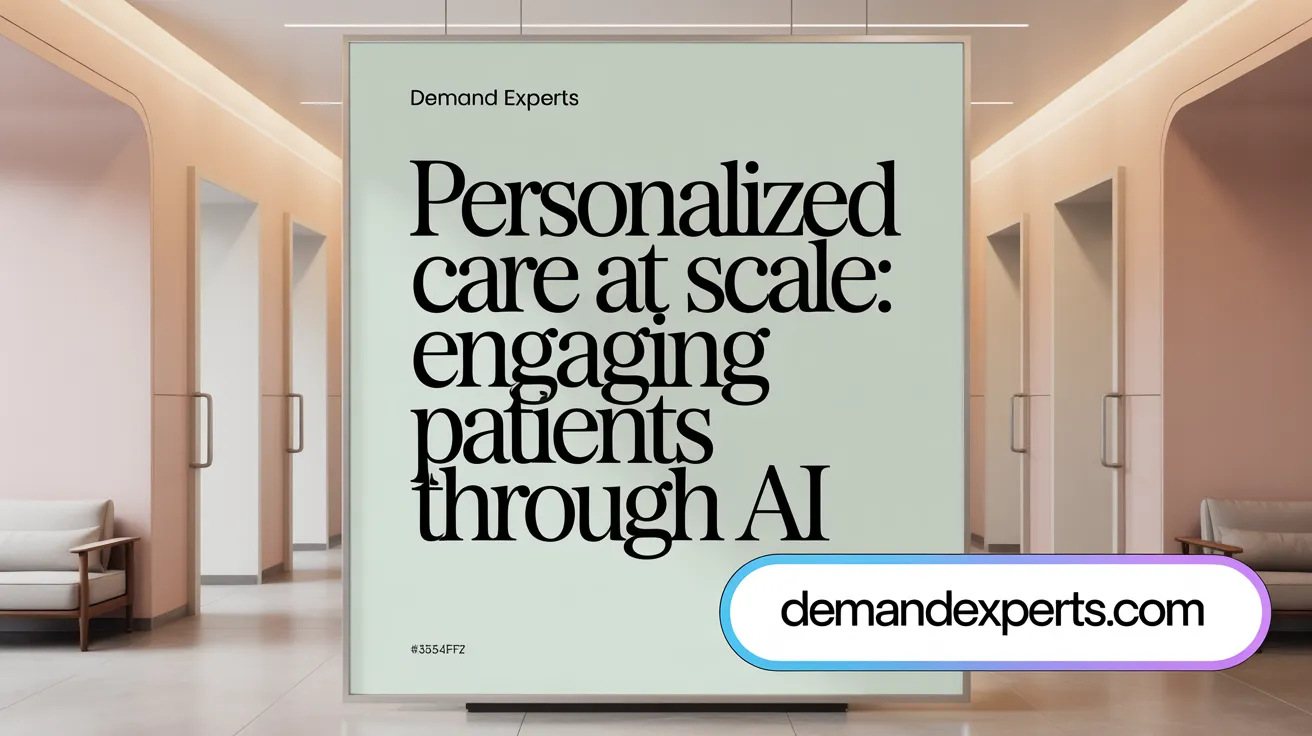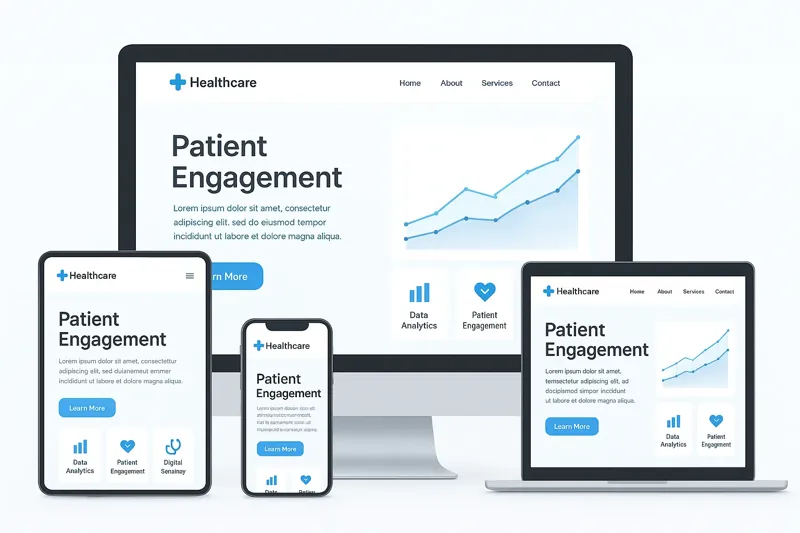Introduction: The Role of AI Live Chat in Modern Healthcare
Overview of AI Live Chat in Healthcare
AI live chat, powered by conversational and generative artificial intelligence, has become an essential tool in modern healthcare. These digital assistants are designed to interact with patients around the clock, providing instant support for appointment scheduling, symptom triage, medication reminders, and health education. Their ability to simulate natural human conversations through advanced natural language processing (NLP) technologies enables precise, context-aware responses that improve patient engagement and streamline healthcare workflows.
Importance of Patient Satisfaction and Retention
Patient satisfaction and retention are critical metrics for healthcare organizations, directly influencing operational efficiency and long-term success. AI live chat enhances patient experience by offering 24/7 accessibility, reducing wait times, and personalizing communication based on patient preferences. This continuous and seamless interaction fosters trust, promotes adherence to care plans, and encourages patients to maintain ongoing relationships with their providers, ultimately leading to higher retention rates.
Emerging Technologies Enhancing Patient Experience
New advancements in AI, including large language models, sentiment analysis, and contextual awareness, have significantly elevated the capabilities of AI live chat platforms. Integration with electronic health records (EHRs), patient portals, and telehealth systems allows these chatbots to deliver personalized, timely, and accurate information. Generative AI further enhances adaptability and responsiveness, while ensuring compliance with healthcare privacy standards like HIPAA. Together, these technologies are transforming patient communication, making healthcare more accessible, efficient, and patient-centered.
AI Live Chat: Revolutionizing Patient Interaction and Accessibility

24/7 Patient Support Through AI Chatbots
AI live chatbots provide continuous, round-the-clock support, allowing patients to access healthcare assistance anytime, including outside traditional office hours. This 24/7 patient support significantly enhances patient convenience and satisfaction, as seen in systems like OSF HealthCare's Clare, where nearly half of all interactions occur after business hours. Such accessibility ensures immediate responses to inquiries, reducing wait times and minimizing patient frustration.
Appointment Scheduling and Reminders
AI chatbots streamline appointment scheduling by automating bookings, cancellations, and rescheduling processes. This reduces administrative burdens on healthcare staff and minimizes no-shows through automated reminders tailored to patient preferences. Digital self-scheduling tools are rapidly adopting chatbot integration, enabling patients to quickly secure appointments with just a few clicks, thereby improving overall operational efficiency.
Symptom Checking and Triage
Advanced AI chatbots employ natural language processing and clinically validated protocols to perform symptom analysis and triage. By guiding patients through targeted questioning, chatbots can determine the urgency and type of care needed, directing patients to appropriate resources or escalating to clinicians when necessary. This function aids in managing high patient volumes effectively, ensuring timely intervention while reducing unnecessary clinical visits.
Medication Adherence and Chronic Disease Management
AI live chat solutions play a pivotal role in chronic disease management with AI by providing real-time medication reminders, clarifying treatment plans, and supporting ongoing patient monitoring. Adherence rates in programs enhanced by chatbots have reached as high as 97%. These medication adherence with chatbots virtual assistants demystify complex medical instructions, offering explanations and encouragement that sustain patient engagement and adherence over time.
Real-time Patient Education and Assistance
Real-time educational support is a critical feature of AI chatbots, which deliver personalized health information, answer patient questions, and clarify medical instructions instantly. This functionality empowers patients to better understand their health conditions and treatments, fostering informed decision-making. Combined with patient disclosure and human oversight in AI and clear disclosure about chatbot roles, this enhances trust and ensures the safety and accuracy of information delivered.
Overall, AI live chat is transforming patient interaction by offering accessible, efficient, and personalized healthcare support that benefits both patients and providers through improved engagement, operational efficiency, and satisfaction.
Enhancing Operational Efficiency and Reducing Clinician Burden
Automation of Routine Administrative Tasks
AI chatbots in healthcare automate routine tasks such as scheduling appointments, managing patient registrations, billing inquiries, and data entry. By handling these repetitive administrative functions, chatbots free healthcare staff to focus more on direct patient care. For example, systems powered by natural language processing enable seamless appointment booking, registration updates, and insurance verification with minimal human intervention (Conversational AI in healthcare).
Reduction of Call Center Volumes and Wait Times
Conversational AI tools significantly decrease call center burdens by managing patient inquiries 24/7. Reports indicate up to a 35% reduction in call center wait times and around 15% drop in call volumes due to chatbot adoption. AI chatbots resolve common patient questions instantly, redirect urgent cases appropriately, and reduce no-show rates by automating reminders, thereby streamlining patient flow and improving operational efficiency (AI chatbots enhance patient adherence).
Integration with Electronic Health Records (EHR) and Healthcare IT Systems
AI chatbots are increasingly integrated with EHRs, telemedicine platforms, pharmacy, billing systems, and wearable devices. This integration allows real-time access to patient information, enabling chatbots to provide personalized communication, medication reminders, and follow-up care instructions (Medication adherence with chatbots. Moreover, seamless IT interoperability supports clinicians by automating documentation and clinical workflows, enhancing overall practice productivity (AI decision support systems in healthcare).
Supporting Clinicians Without Replacing Them
AI chatbots serve as scalable extensions of clinician support, not replacements. They assist by providing timely patient information, facilitating chronic disease management, and performing initial triage assessments. Human oversight remains critical, with chatbots designed to disclose their virtual nature and escalate complex cases to healthcare professionals (Human oversight in AI chatbot use. This hybrid approach maintains safety, accuracy, and fosters clinician acceptance while easing their workload.
Cost-saving Potential Through AI Chatbots
The deployment of AI chatbots leads to significant cost reductions by decreasing reliance on additional staff and minimizing administrative overhead (Cost-saving healthcare chatbots). For instance, healthcare organizations report global cost savings projected to reach billions annually by automating scheduling and patient engagement tasks (Healthcare chatbot market growth). Chatbots also reduce unnecessary visits by guiding patients to appropriate care settings, lowering operational expenses while increasing patient satisfaction and retention (Patient satisfaction and retention).
Boosting Patient Engagement and Personalized Communication

Achieving High Patient Engagement and Adherence with AI Chatbots
AI chatbots have demonstrated exceptional effectiveness in healthcare by engaging patients actively in managing their health. Engagement rates have been reported to surpass 90%, with medication adherence reaching as high as 97%. This high level of participation promotes better health outcomes and supports ongoing patient care.
Leveraging Natural Language Processing for Empathy and Understanding
Natural Language Processing (NLP) technology enables AI chatbots to simulate human-like conversations. By interpreting patient input with emotional and contextual awareness, chatbots provide empathetic responses that resonate with patients, building trust and encouraging open communication.
Tailored Messaging and Interactive Health Education
Personalized communication is a cornerstone of effective patient engagement. AI chatbots customize messaging based on individual patient history, preferences, and literacy levels. This includes personalized health education, medication reminders, and real-time explanations that help demystify medical instructions and enhance patient understanding (real-time medical reminders, patient education via chatbots.
Personalization Using Patient History and Preferences
By integrating data such as previous medical interactions and health conditions, AI chatbots adapt their interactions to meet each patient’s specific needs. This ensures relevant information delivery, improves care plan adherence, and fosters a proactive patient participation model (personalized AI-driven patient communication, adherence to care plans using AI.
Supporting Diverse Populations and Language Accessibility
Advanced AI chatbots are designed to overcome cultural and linguistic barriers through multilingual healthcare chatbots capabilities and culturally sensitive content (equitable care with chatbots). This enhances accessibility for underserved and diverse patient populations, ensuring equitable care and improving engagement across demographic groups.
Building Trust and Safety through Transparency and Human Oversight

Patient Disclosure Regarding AI Chatbot Use
Clear communication with patients about the involvement of AI chatbots in healthcare in their care is essential. Informing patients that they are interacting with a virtual assistant, rather than a human, establishes transparency and manages expectations. This openness fosters trust by avoiding confusion and reinforcing the supportive role of chatbots in healthcare delivery.
Options to Escalate to Human Support
Patients must have the ability to seamlessly transition from chatbot interactions to human assistance when needed. Providing straightforward options for escalation to clinicians or support staff ensures that complex or sensitive issues receive appropriate human attention, maintaining safety and personalized care. This approach aligns with strategies in patient communication via messaging and human oversight in AI chatbot use.
Ensuring Data Privacy and HIPAA Compliance
AI chatbots deployed in healthcare settings must adhere strictly to HIPAA regulations and other data privacy standards. Employing industry-standard encryption, secure data handling practices, and not retaining unnecessary chat histories protect patient confidentiality and safeguard sensitive health information. Robust privacy and security in Medical Chat and healthcare chatbot safety concerns are foundational for patient trust.
Addressing Safety, Accuracy, and Ethical Concerns
Robust design and continuous monitoring are crucial to mitigate risks related to misinformation, misdiagnosis, and ethical issues. Incorporation of clinician oversight and regular content review help maintain the accuracy and appropriateness of chatbot responses, ensuring patient safety and ethical compliance. Consideration of ethical and regulatory considerations in healthcare chatbots supports these efforts.
Combining AI Assistance with Clinician Review
AI chatbots act as adjuncts rather than replacements for clinical judgment. Integrating chatbots into workflows with clinician review of chatbot-generated recommendations or responses strengthens decision support, improves diagnostic accuracy, and reinforces patient confidence in the care process. This integration improves clinical decision support AI and supports AI-enhanced patient workflows.
By emphasizing transparency, providing human support options, ensuring privacy, and combining AI with clinician oversight, healthcare providers can build patient trust and deliver safe, effective AI-augmented care models.
AI Live Chat as a Key Strategy for Improving Patient Retention

Impact on patient satisfaction and loyalty
AI-powered live chat services provide patients with immediate access to healthcare information and support, increasing convenience and reducing frustration associated with traditional communication delays. This responsiveness fosters a positive patient experience, which in turn drives greater loyalty and trust in healthcare providers. Studies indicate conversational AI solutions often outperform human counterparts in empathy and tone, contributing to higher patient satisfaction rates.
Reducing no-shows and improving appointment adherence
Live chat platforms integrated with AI facilitate seamless scheduling and rescheduling of appointments, sending timely reminders and preparation instructions personalized to individual patient needs. These features significantly reduce no-show rates and improve adherence to care plans, with engagement rates for chatbot reminders reported to exceed 90% in some cases. Improved adherence translates into better health outcomes and stable revenue streams for healthcare organizations.
Enhancing responsiveness and communication channels
The 24/7 availability of AI live chat allows patients to receive assistance outside traditional business hours, addressing urgent queries proactively. Conversational AI can handle a large volume of simultaneous interactions, ensuring that patients receive consistent, accurate information instantly without increasing staff workload. Integration with multiple channels—such as websites, patient portals, and mobile apps—creates a unified, accessible communication ecosystem as covered in healthcare chatbot market growth.
Supporting ongoing patient engagement and follow-up care
AI live chat systems extend beyond initial contact, enabling personalized follow-up care communications, medication reminders, and educational content delivery. This continuous engagement supports chronic disease management and fosters behavioral adherence, with some platforms demonstrating medication adherence rates near 97%. These proactive interactions encourage patients to stay connected with their healthcare providers over the long term.
Facilitating patient referrals through positive experiences
Satisfied patients are more likely to recommend their healthcare providers. AI live chat contributes to positive patient interactions by providing easy access to information, transparency, and timely support, which improves overall patient retention and encourages word-of-mouth referrals. A well-designed AI live chat experience reinforces patient trust, thereby expanding the provider's patient base through organic growth as described in patient retention strategies.
Addressing Challenges and Limitations of AI Chatbots in Healthcare
Risks of Misdiagnosis and Misinformation
AI chatbots, while transformative, carry risks such as misdiagnosis and dissemination of inaccurate information. These errors can stem from limitations in natural language processing, incomplete patient data, or overgeneralized responses. Ensuring chatbot content is reviewed by clinicians and incorporating transparent disclaimers help mitigate these risks as discussed in ethical use of AI chatbots.
Maintaining Human Touch in Sensitive Interactions
Chatbots often lack the empathetic nuances necessary for sensitive healthcare conversations. This limitation can affect patient trust and satisfaction, especially in mental health or complex cases. Optimal deployment involves human oversight in AI chatbot use and easy escalation paths for patients to connect with qualified clinicians, ensuring transparency and empathy in AI healthcare tools.
Technical Challenges and Usability Issues
Challenges such as language processing difficulties, integration with diverse healthcare IT systems, and variable patient digital literacy can hinder chatbot effectiveness. Designing user-friendly interfaces and offering multilingual support improve accessibility and usability as highlighted in conversational AI in healthcare.
Ethical and Medicolegal Considerations
AI chatbots must comply with privacy regulations like HIPAA and address ethical concerns around data security, consent, and transparency. Establishing robust governance frameworks, clear patient disclosures, and human-in-the-loop approaches help ensure responsible use, outlined in privacy and safety in AI chatbots.
Avoiding Overreliance on AI Systems
Overdependence on chatbot advice can undermine clinical judgment and patient safety. Educating patients about chatbot roles as supportive tools, not replacements for professional care, and maintaining human clinician review safeguards appropriate use, as discussed in limitations of healthcare chatbots.
By proactively managing these limitations, healthcare organizations can leverage AI chatbots effectively while maintaining patient safety, trust, and quality of care.
Future Outlook: Integrating Advanced AI Technologies in Live Chat

Generative AI and Large Language Models Enhancing Chatbots
Generative AI, including state-of-the-art large language models (LLMs) like GPT-4, is revolutionizing healthcare chatbots by enabling more natural, context-aware, and accurate patient interactions. These advancements facilitate conversational AI systems that handle complex queries and adapt in real time, improving user engagement and trust.
Proactive and Predictive Patient Care
Advanced AI systems harness predictive analytics to anticipate patient health risks and personalize interventions. Predictive capabilities support proactive outreach, such as timely follow-up messaging and customized care recommendations, enhancing adherence and clinical outcomes.
Integration with Telehealth and Wearable Devices
The future of AI-powered live chat includes seamless integration with telehealth platforms and wearable health devices. This convergence allows real-time monitoring and data sharing, enabling chatbots to provide timely health coaching, symptom tracking, and early warning alerts within the patient's care pathway.
Hyper-Personalization and Emotion-Aware AI
Next-generation chatbots will deliver hyper-personalized communication tailored to patients' medical histories and emotional contexts. Emotion-aware AI can detect sentiment and adapt responses empathetically, enhancing patient satisfaction and fostering deeper patient-provider relationships.
Growing Market and Adoption Trends
The healthcare chatbot market is expanding rapidly, with projections estimating growth to over $10 billion by 2034 at a CAGR around 24%. Increasing physician acceptance, patient demand for 24/7 accessible support, and integration with existing healthcare IT systems drive widespread adoption across diverse care settings.
Incorporating these advanced AI technologies into live chat solutions promises to streamline healthcare delivery, improve patient experience, and optimize clinical workflows, positioning AI chatbots as essential tools in modern patient engagement strategies.
Case Studies and Real-World Applications of AI Live Chat
OSF HealthCare's Clare Virtual Assistant
OSF HealthCare's implementation of the Clare virtual health assistant illustrates the practical impact of chatbots in healthcare. Since its 2019 launch, Clare has become a 24/7 point of contact for patients, handling services such as symptom checking chatbots, appointment scheduling chatbots, bill payments, and live nurse chats. Remarkably, nearly half of interactions occur outside business hours, emphasizing patient demand for continuous access. Clare's integration into operational workflows has driven $2.4 million in first-year savings by decreasing call volumes and boosting revenue through enhanced patient engagement (patient engagement with chatbots.
Operational Savings and Patient Satisfaction
AI live chat solutions like Clare contribute substantially to operational efficiency in healthcare by automating routine tasks that previously required significant staff time. This results in cost reduction and improved resource allocation (cost-saving healthcare chatbots. By providing instant responses around the clock, these chatbots reduce patient wait times and phone queue frustrations, leading to higher patient satisfaction scores. Studies report chatbot-engagement rates exceeding 90% and medication adherence rates up to 97%, two critical metrics signaling improved treatment compliance and positive patient outcomes.
Use in Mental Health and Chronic Disease Management
Beyond administrative tasks, AI chatbots are proving effective in clinical support, particularly for mental health chatbots and chronic disease management with AI. Tools such as Sensely’s Molly and Babylon Health offer symptom analysis AI and ongoing therapeutic support chatbots. Through personalized reminders, education, and real-time guidance, chatbots help patients better manage their conditions. Importantly, human oversight in AI chatbot use and transparency about the chatbot's role maintain safety and trust (safety and privacy in AI chatbots.
Success Metrics and Lessons Learned
High engagement rates, adherence improvements, and reduced clinician workload exemplify successful AI chatbot deployments (reducing clinician workload with chatbots. Essential lessons for healthcare providers include:
- Designing systems with clear patient disclosure and human oversight in AI and options to request human assistance
- Ensuring rigorous clinical validation and data privacy compliance
- Continuously monitoring and refining AI interactions for accuracy and empathy (chatbot empathy in patient care)
- Leveraging chatbots to complement, not replace, clinician care (clinical functions of chatbots
Healthcare organizations adopting AI live chat should prioritize integration with existing systems (integration with electronic health records and foster clinician buy-in to maximize benefits and patient trust (clinician acceptance of AI tools.
Conclusion: The Transformative Potential of AI Live Chat in Healthcare
Advancing Patient and Provider Outcomes
AI live chat technologies have demonstrably enhanced healthcare by improving patient engagement and operational efficiencies. Patients benefit from 24/7 access to personalized support, including appointment scheduling, symptom triage, medication reminders, and real-time education. This accessibility reduces anxiety and increases care adherence, especially for chronic disease management.
Providers gain efficiency through automation of routine administrative tasks, reduced clinician workload, and actionable data collection. The scalability of AI chatbots enables high patient volumes to be managed without proportional increases in staffing, supporting sustainability and cost savings.
Driving Satisfaction and Retention
AI chatbots play a pivotal role in elevating patient satisfaction by delivering timely, empathetic, and clear communication. High engagement and medication adherence rates—sometimes exceeding 90% and 97% respectively—underscore their effectiveness. These interactions foster patient loyalty and encourage ongoing utilization of healthcare services, directly impacting retention.
Prioritizing Responsible Deployment
To maximize benefits while mitigating risks, responsible AI implementation is essential. Human oversight should accompany chatbot deployment to ensure accuracy, safety, and privacy. Transparency with patients about AI use and the option to escalate to human providers builds trust and ethical compliance.
Fostering Ongoing Innovation
Continued advancement and adoption of AI live chat solutions are encouraged to further transform patient experiences and healthcare delivery models. Embracing these innovative tools, aligned with robust governance and clinical integration, will enable health systems to meet growing demands while maintaining high-quality care and patient-centered service.
Introduction: The Role of AI Live Chat in Modern Healthcare
Overview of AI Live Chat in Healthcare
AI live chat, powered by conversational and generative artificial intelligence, has become an essential tool in modern healthcare. These digital assistants are designed to interact with patients around the clock, providing instant support for appointment scheduling, symptom triage, medication reminders, and health education. Their ability to simulate natural human conversations through advanced natural language processing (NLP) technologies enables precise, context-aware responses that improve patient engagement and streamline healthcare workflows.
Importance of Patient Satisfaction and Retention
Patient satisfaction and retention are critical metrics for healthcare organizations, directly influencing operational efficiency and long-term success. AI live chat enhances patient experience by offering 24/7 accessibility, reducing wait times, and personalizing communication based on patient preferences. This continuous and seamless interaction fosters trust, promotes adherence to care plans, and encourages patients to maintain ongoing relationships with their providers, ultimately leading to higher retention rates.
Emerging Technologies Enhancing Patient Experience
New advancements in AI, including large language models, sentiment analysis, and contextual awareness, have significantly elevated the capabilities of AI live chat platforms. Integration with electronic health records (EHRs), patient portals, and telehealth systems allows these chatbots to deliver personalized, timely, and accurate information. Generative AI further enhances adaptability and responsiveness, while ensuring compliance with healthcare privacy standards like HIPAA. Together, these technologies are transforming patient communication, making healthcare more accessible, efficient, and patient-centered.
AI Live Chat: Revolutionizing Patient Interaction and Accessibility

24/7 Patient Support Through AI Chatbots
AI live chatbots provide continuous, round-the-clock support, allowing patients to access healthcare assistance anytime, including outside traditional office hours. This 24/7 patient support significantly enhances patient convenience and satisfaction, as seen in systems like OSF HealthCare's Clare, where nearly half of all interactions occur after business hours. Such accessibility ensures immediate responses to inquiries, reducing wait times and minimizing patient frustration.
Appointment Scheduling and Reminders
AI chatbots streamline appointment scheduling by automating bookings, cancellations, and rescheduling processes. This reduces administrative burdens on healthcare staff and minimizes no-shows through automated reminders tailored to patient preferences. Digital self-scheduling tools are rapidly adopting chatbot integration, enabling patients to quickly secure appointments with just a few clicks, thereby improving overall operational efficiency.
Symptom Checking and Triage
Advanced AI chatbots employ natural language processing and clinically validated protocols to perform symptom analysis and triage. By guiding patients through targeted questioning, chatbots can determine the urgency and type of care needed, directing patients to appropriate resources or escalating to clinicians when necessary. This function aids in managing high patient volumes effectively, ensuring timely intervention while reducing unnecessary clinical visits.
Medication Adherence and Chronic Disease Management
AI live chat solutions play a pivotal role in chronic disease management with AI by providing real-time medication reminders, clarifying treatment plans, and supporting ongoing patient monitoring. Adherence rates in programs enhanced by chatbots have reached as high as 97%. These medication adherence with chatbots virtual assistants demystify complex medical instructions, offering explanations and encouragement that sustain patient engagement and adherence over time.
Real-time Patient Education and Assistance
Real-time educational support is a critical feature of AI chatbots, which deliver personalized health information, answer patient questions, and clarify medical instructions instantly. This functionality empowers patients to better understand their health conditions and treatments, fostering informed decision-making. Combined with patient disclosure and human oversight in AI and clear disclosure about chatbot roles, this enhances trust and ensures the safety and accuracy of information delivered.
Overall, AI live chat is transforming patient interaction by offering accessible, efficient, and personalized healthcare support that benefits both patients and providers through improved engagement, operational efficiency, and satisfaction.
Enhancing Operational Efficiency and Reducing Clinician Burden
Automation of Routine Administrative Tasks
AI chatbots in healthcare automate routine tasks such as scheduling appointments, managing patient registrations, billing inquiries, and data entry. By handling these repetitive administrative functions, chatbots free healthcare staff to focus more on direct patient care. For example, systems powered by natural language processing enable seamless appointment booking, registration updates, and insurance verification with minimal human intervention (Conversational AI in healthcare).
Reduction of Call Center Volumes and Wait Times
Conversational AI tools significantly decrease call center burdens by managing patient inquiries 24/7. Reports indicate up to a 35% reduction in call center wait times and around 15% drop in call volumes due to chatbot adoption. AI chatbots resolve common patient questions instantly, redirect urgent cases appropriately, and reduce no-show rates by automating reminders, thereby streamlining patient flow and improving operational efficiency (AI chatbots enhance patient adherence).
Integration with Electronic Health Records (EHR) and Healthcare IT Systems
AI chatbots are increasingly integrated with EHRs, telemedicine platforms, pharmacy, billing systems, and wearable devices. This integration allows real-time access to patient information, enabling chatbots to provide personalized communication, medication reminders, and follow-up care instructions (Medication adherence with chatbots. Moreover, seamless IT interoperability supports clinicians by automating documentation and clinical workflows, enhancing overall practice productivity (AI decision support systems in healthcare).
Supporting Clinicians Without Replacing Them
AI chatbots serve as scalable extensions of clinician support, not replacements. They assist by providing timely patient information, facilitating chronic disease management, and performing initial triage assessments. Human oversight remains critical, with chatbots designed to disclose their virtual nature and escalate complex cases to healthcare professionals (Human oversight in AI chatbot use. This hybrid approach maintains safety, accuracy, and fosters clinician acceptance while easing their workload.
Cost-saving Potential Through AI Chatbots
The deployment of AI chatbots leads to significant cost reductions by decreasing reliance on additional staff and minimizing administrative overhead (Cost-saving healthcare chatbots). For instance, healthcare organizations report global cost savings projected to reach billions annually by automating scheduling and patient engagement tasks (Healthcare chatbot market growth). Chatbots also reduce unnecessary visits by guiding patients to appropriate care settings, lowering operational expenses while increasing patient satisfaction and retention (Patient satisfaction and retention).
Boosting Patient Engagement and Personalized Communication

Achieving High Patient Engagement and Adherence with AI Chatbots
AI chatbots have demonstrated exceptional effectiveness in healthcare by engaging patients actively in managing their health. Engagement rates have been reported to surpass 90%, with medication adherence reaching as high as 97%. This high level of participation promotes better health outcomes and supports ongoing patient care.
Leveraging Natural Language Processing for Empathy and Understanding
Natural Language Processing (NLP) technology enables AI chatbots to simulate human-like conversations. By interpreting patient input with emotional and contextual awareness, chatbots provide empathetic responses that resonate with patients, building trust and encouraging open communication.
Tailored Messaging and Interactive Health Education
Personalized communication is a cornerstone of effective patient engagement. AI chatbots customize messaging based on individual patient history, preferences, and literacy levels. This includes personalized health education, medication reminders, and real-time explanations that help demystify medical instructions and enhance patient understanding (real-time medical reminders, patient education via chatbots.
Personalization Using Patient History and Preferences
By integrating data such as previous medical interactions and health conditions, AI chatbots adapt their interactions to meet each patient’s specific needs. This ensures relevant information delivery, improves care plan adherence, and fosters a proactive patient participation model (personalized AI-driven patient communication, adherence to care plans using AI.
Supporting Diverse Populations and Language Accessibility
Advanced AI chatbots are designed to overcome cultural and linguistic barriers through multilingual healthcare chatbots capabilities and culturally sensitive content (equitable care with chatbots). This enhances accessibility for underserved and diverse patient populations, ensuring equitable care and improving engagement across demographic groups.
Building Trust and Safety through Transparency and Human Oversight

Patient Disclosure Regarding AI Chatbot Use
Clear communication with patients about the involvement of AI chatbots in healthcare in their care is essential. Informing patients that they are interacting with a virtual assistant, rather than a human, establishes transparency and manages expectations. This openness fosters trust by avoiding confusion and reinforcing the supportive role of chatbots in healthcare delivery.
Options to Escalate to Human Support
Patients must have the ability to seamlessly transition from chatbot interactions to human assistance when needed. Providing straightforward options for escalation to clinicians or support staff ensures that complex or sensitive issues receive appropriate human attention, maintaining safety and personalized care. This approach aligns with strategies in patient communication via messaging and human oversight in AI chatbot use.
Ensuring Data Privacy and HIPAA Compliance
AI chatbots deployed in healthcare settings must adhere strictly to HIPAA regulations and other data privacy standards. Employing industry-standard encryption, secure data handling practices, and not retaining unnecessary chat histories protect patient confidentiality and safeguard sensitive health information. Robust privacy and security in Medical Chat and healthcare chatbot safety concerns are foundational for patient trust.
Addressing Safety, Accuracy, and Ethical Concerns
Robust design and continuous monitoring are crucial to mitigate risks related to misinformation, misdiagnosis, and ethical issues. Incorporation of clinician oversight and regular content review help maintain the accuracy and appropriateness of chatbot responses, ensuring patient safety and ethical compliance. Consideration of ethical and regulatory considerations in healthcare chatbots supports these efforts.
Combining AI Assistance with Clinician Review
AI chatbots act as adjuncts rather than replacements for clinical judgment. Integrating chatbots into workflows with clinician review of chatbot-generated recommendations or responses strengthens decision support, improves diagnostic accuracy, and reinforces patient confidence in the care process. This integration improves clinical decision support AI and supports AI-enhanced patient workflows.
By emphasizing transparency, providing human support options, ensuring privacy, and combining AI with clinician oversight, healthcare providers can build patient trust and deliver safe, effective AI-augmented care models.
AI Live Chat as a Key Strategy for Improving Patient Retention

Impact on patient satisfaction and loyalty
AI-powered live chat services provide patients with immediate access to healthcare information and support, increasing convenience and reducing frustration associated with traditional communication delays. This responsiveness fosters a positive patient experience, which in turn drives greater loyalty and trust in healthcare providers. Studies indicate conversational AI solutions often outperform human counterparts in empathy and tone, contributing to higher patient satisfaction rates.
Reducing no-shows and improving appointment adherence
Live chat platforms integrated with AI facilitate seamless scheduling and rescheduling of appointments, sending timely reminders and preparation instructions personalized to individual patient needs. These features significantly reduce no-show rates and improve adherence to care plans, with engagement rates for chatbot reminders reported to exceed 90% in some cases. Improved adherence translates into better health outcomes and stable revenue streams for healthcare organizations.
Enhancing responsiveness and communication channels
The 24/7 availability of AI live chat allows patients to receive assistance outside traditional business hours, addressing urgent queries proactively. Conversational AI can handle a large volume of simultaneous interactions, ensuring that patients receive consistent, accurate information instantly without increasing staff workload. Integration with multiple channels—such as websites, patient portals, and mobile apps—creates a unified, accessible communication ecosystem as covered in healthcare chatbot market growth.
Supporting ongoing patient engagement and follow-up care
AI live chat systems extend beyond initial contact, enabling personalized follow-up care communications, medication reminders, and educational content delivery. This continuous engagement supports chronic disease management and fosters behavioral adherence, with some platforms demonstrating medication adherence rates near 97%. These proactive interactions encourage patients to stay connected with their healthcare providers over the long term.
Facilitating patient referrals through positive experiences
Satisfied patients are more likely to recommend their healthcare providers. AI live chat contributes to positive patient interactions by providing easy access to information, transparency, and timely support, which improves overall patient retention and encourages word-of-mouth referrals. A well-designed AI live chat experience reinforces patient trust, thereby expanding the provider's patient base through organic growth as described in patient retention strategies.
Addressing Challenges and Limitations of AI Chatbots in Healthcare
Risks of Misdiagnosis and Misinformation
AI chatbots, while transformative, carry risks such as misdiagnosis and dissemination of inaccurate information. These errors can stem from limitations in natural language processing, incomplete patient data, or overgeneralized responses. Ensuring chatbot content is reviewed by clinicians and incorporating transparent disclaimers help mitigate these risks as discussed in ethical use of AI chatbots.
Maintaining Human Touch in Sensitive Interactions
Chatbots often lack the empathetic nuances necessary for sensitive healthcare conversations. This limitation can affect patient trust and satisfaction, especially in mental health or complex cases. Optimal deployment involves human oversight in AI chatbot use and easy escalation paths for patients to connect with qualified clinicians, ensuring transparency and empathy in AI healthcare tools.
Technical Challenges and Usability Issues
Challenges such as language processing difficulties, integration with diverse healthcare IT systems, and variable patient digital literacy can hinder chatbot effectiveness. Designing user-friendly interfaces and offering multilingual support improve accessibility and usability as highlighted in conversational AI in healthcare.
Ethical and Medicolegal Considerations
AI chatbots must comply with privacy regulations like HIPAA and address ethical concerns around data security, consent, and transparency. Establishing robust governance frameworks, clear patient disclosures, and human-in-the-loop approaches help ensure responsible use, outlined in privacy and safety in AI chatbots.
Avoiding Overreliance on AI Systems
Overdependence on chatbot advice can undermine clinical judgment and patient safety. Educating patients about chatbot roles as supportive tools, not replacements for professional care, and maintaining human clinician review safeguards appropriate use, as discussed in limitations of healthcare chatbots.
By proactively managing these limitations, healthcare organizations can leverage AI chatbots effectively while maintaining patient safety, trust, and quality of care.
Future Outlook: Integrating Advanced AI Technologies in Live Chat

Generative AI and Large Language Models Enhancing Chatbots
Generative AI, including state-of-the-art large language models (LLMs) like GPT-4, is revolutionizing healthcare chatbots by enabling more natural, context-aware, and accurate patient interactions. These advancements facilitate conversational AI systems that handle complex queries and adapt in real time, improving user engagement and trust.
Proactive and Predictive Patient Care
Advanced AI systems harness predictive analytics to anticipate patient health risks and personalize interventions. Predictive capabilities support proactive outreach, such as timely follow-up messaging and customized care recommendations, enhancing adherence and clinical outcomes.
Integration with Telehealth and Wearable Devices
The future of AI-powered live chat includes seamless integration with telehealth platforms and wearable health devices. This convergence allows real-time monitoring and data sharing, enabling chatbots to provide timely health coaching, symptom tracking, and early warning alerts within the patient's care pathway.
Hyper-Personalization and Emotion-Aware AI
Next-generation chatbots will deliver hyper-personalized communication tailored to patients' medical histories and emotional contexts. Emotion-aware AI can detect sentiment and adapt responses empathetically, enhancing patient satisfaction and fostering deeper patient-provider relationships.
Growing Market and Adoption Trends
The healthcare chatbot market is expanding rapidly, with projections estimating growth to over $10 billion by 2034 at a CAGR around 24%. Increasing physician acceptance, patient demand for 24/7 accessible support, and integration with existing healthcare IT systems drive widespread adoption across diverse care settings.
Incorporating these advanced AI technologies into live chat solutions promises to streamline healthcare delivery, improve patient experience, and optimize clinical workflows, positioning AI chatbots as essential tools in modern patient engagement strategies.
Case Studies and Real-World Applications of AI Live Chat
OSF HealthCare's Clare Virtual Assistant
OSF HealthCare's implementation of the Clare virtual health assistant illustrates the practical impact of chatbots in healthcare. Since its 2019 launch, Clare has become a 24/7 point of contact for patients, handling services such as symptom checking chatbots, appointment scheduling chatbots, bill payments, and live nurse chats. Remarkably, nearly half of interactions occur outside business hours, emphasizing patient demand for continuous access. Clare's integration into operational workflows has driven $2.4 million in first-year savings by decreasing call volumes and boosting revenue through enhanced patient engagement (patient engagement with chatbots.
Operational Savings and Patient Satisfaction
AI live chat solutions like Clare contribute substantially to operational efficiency in healthcare by automating routine tasks that previously required significant staff time. This results in cost reduction and improved resource allocation (cost-saving healthcare chatbots. By providing instant responses around the clock, these chatbots reduce patient wait times and phone queue frustrations, leading to higher patient satisfaction scores. Studies report chatbot-engagement rates exceeding 90% and medication adherence rates up to 97%, two critical metrics signaling improved treatment compliance and positive patient outcomes.
Use in Mental Health and Chronic Disease Management
Beyond administrative tasks, AI chatbots are proving effective in clinical support, particularly for mental health chatbots and chronic disease management with AI. Tools such as Sensely’s Molly and Babylon Health offer symptom analysis AI and ongoing therapeutic support chatbots. Through personalized reminders, education, and real-time guidance, chatbots help patients better manage their conditions. Importantly, human oversight in AI chatbot use and transparency about the chatbot's role maintain safety and trust (safety and privacy in AI chatbots.
Success Metrics and Lessons Learned
High engagement rates, adherence improvements, and reduced clinician workload exemplify successful AI chatbot deployments (reducing clinician workload with chatbots. Essential lessons for healthcare providers include:
- Designing systems with clear patient disclosure and human oversight in AI and options to request human assistance
- Ensuring rigorous clinical validation and data privacy compliance
- Continuously monitoring and refining AI interactions for accuracy and empathy (chatbot empathy in patient care)
- Leveraging chatbots to complement, not replace, clinician care (clinical functions of chatbots
Healthcare organizations adopting AI live chat should prioritize integration with existing systems (integration with electronic health records and foster clinician buy-in to maximize benefits and patient trust (clinician acceptance of AI tools.
Conclusion: The Transformative Potential of AI Live Chat in Healthcare
Advancing Patient and Provider Outcomes
AI live chat technologies have demonstrably enhanced healthcare by improving patient engagement and operational efficiencies. Patients benefit from 24/7 access to personalized support, including appointment scheduling, symptom triage, medication reminders, and real-time education. This accessibility reduces anxiety and increases care adherence, especially for chronic disease management.
Providers gain efficiency through automation of routine administrative tasks, reduced clinician workload, and actionable data collection. The scalability of AI chatbots enables high patient volumes to be managed without proportional increases in staffing, supporting sustainability and cost savings.
Driving Satisfaction and Retention
AI chatbots play a pivotal role in elevating patient satisfaction by delivering timely, empathetic, and clear communication. High engagement and medication adherence rates—sometimes exceeding 90% and 97% respectively—underscore their effectiveness. These interactions foster patient loyalty and encourage ongoing utilization of healthcare services, directly impacting retention.
Prioritizing Responsible Deployment
To maximize benefits while mitigating risks, responsible AI implementation is essential. Human oversight should accompany chatbot deployment to ensure accuracy, safety, and privacy. Transparency with patients about AI use and the option to escalate to human providers builds trust and ethical compliance.
Fostering Ongoing Innovation
Continued advancement and adoption of AI live chat solutions are encouraged to further transform patient experiences and healthcare delivery models. Embracing these innovative tools, aligned with robust governance and clinical integration, will enable health systems to meet growing demands while maintaining high-quality care and patient-centered service.






